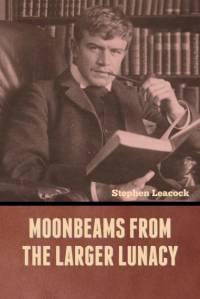Über Moonbeams from the Larger Lunacy
Stephen Leacock was arguably, for a decade or so after the First World War, the most popular humorous writer in English. He is little known today, but his work is surprisingly relevant to modern readers. Some parts have aged beyond relevance, but then there are little spurts of brilliance which he would have dreaded to know are still cacklingly funny now. For example Moonbeams, which is 99 years old, contains a satirical skewering of gamification as a motivation technique for managers. It's the earliest one I've read, and it perfectly encapsulates the flaws in "badges and levels" motivational design. I realise that's a bit obscure, but I presume other people will find other little side references as hilarious as I did, from their own areas of interest. (Timothy Ferguson)
About the author:
Stephen P. H. Butler Leacock FRSC (30 December 1869 - 28 March 1944) was a Canadian teacher, political scientist, writer, and humorist. Between the years 1915 and 1925, he was the best-known English-speaking humorist in the world. He is known for his light humour along with criticisms of people's follies.
Early in his career, Leacock turned to fiction, humour, and short reports to supplement (and ultimately exceed) his regular income. His stories, first published in magazines in Canada and the United States and later in novel form, became extremely popular around the world. It was said in 1911 that more people had heard of Stephen Leacock than had heard of Canada. Between the years 1915 and 1925, Leacock was the most popular humorist in the English-speaking world.
A humorist particularly admired by Leacock was Robert Benchley from New York. Leacock opened correspondence with Benchley, encouraging him in his work and importuning him to compile his work into a book. Benchley did so in 1922, and acknowledged the nagging from north of the border.
Near the end of his life, the US comedian Jack Benny recounted how he had been introduced to Leacock's writing by Groucho Marx when they were both young vaudeville comedians. Benny acknowledged Leacock's influence and, fifty years after first reading him, still considered Leacock one of his favorite comic writers. He was puzzled as to why Leacock's work was no longer well known in the United States. His works can be described as a balancing act between cutting satire and sheer absurdity. He also wrote extensively on his chosen fields of study, political science and political economy. Leacock was professor, but in his works he reflected with wit and ingenuity on everyday situations.
During the summer months, Leacock lived at Old Brewery Bay, his summer estate in Orillia, across Lake Simcoe from where he was raised and also bordering Lake Couchiching. A working farm, Old Brewery Bay is now a museum and National Historic Site of Canada. Gossip provided by the local barber, Jefferson Short, provided Leacock with the material which would become Sunshine Sketches of a Little Town (1912), set in the thinly-disguised Mariposa.
Leacock was awarded the Royal Society of Canada's Lorne Pierce Medal in 1937, nominally for his academic work. (Wikipedia.org)
Mehr anzeigen

